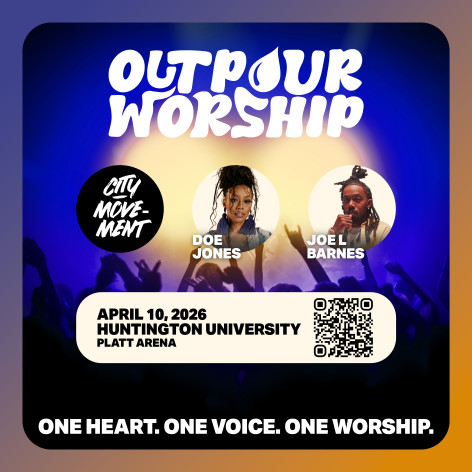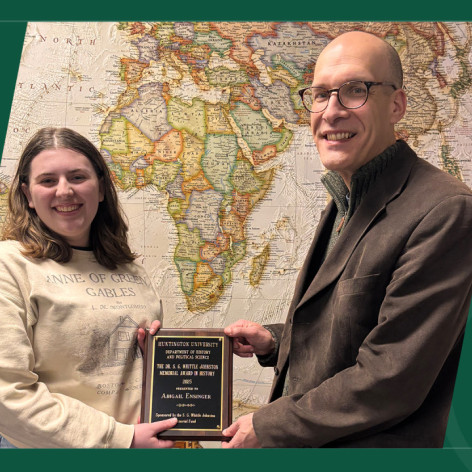Indiana governor visits Huntington University
FOR RELEASE: Tuesday, August 29, 2006
Huntington, Ind.-Indiana Gov. Mitch Daniels fielded questions about obesity, the toll road, ethanol and education at a Huntington University town-hall style gathering today. Approximately 70 students and 30 faculty and staff gathered in the upper level of Habecker Dining Commons to hear Daniels speak. Prior to the event, the governor ate lunch and chatted informally with students.
Daniels expressed his concern about the number of bright and talented individuals Indiana "exports" to other states or countries. One of his goals is to offer incentives for graduates to remain Hoosiers.
"I want to make it possible for every Huntington University student - every college student - to stay in Indiana and have a great life here should they choose to do so."
Peter Owens, a freshman history education major from Indianapolis, Ind., asked Daniels about his efforts to fight obesity. The governor referred to the issue as "a very strong interest" and shared about INShape Indiana, the state's year-old program aimed at making Hoosiers healthier. Daniels' focus is on young people, preventative healthcare and exercise.
"We're probably going to have to do more than have me sweat on national television to motivate people," the governor joked, referring to television coverage of him working out.
Dave Pearson, maintenance technician for the University, asked about the possibility of full-day kindergarten, particularly because his wife is a kindergarten teacher. Daniels voiced his support of the idea and indicated that having achieved the first balanced budget in eight years, that is now a possibility.
"We have the wherewithal to do it," he said. "The reason we didn't do it is because we were broke."
Joel Wentz, a junior music business major from Greencastle, Pa., asked about the state's decision to change to Daylight Savings Time. Daniels' gubernatorial opponent and the previous governor supported Daylight Savings Time.
"The only difference is I'm the only fool who tried to do something about this," he joked.
The reason for the change was economical. Daniels said businesses found it difficult to work with other states because of the time difference.
Amber Surfus, a senior history/political science major from Huntington, Ind., asked about Wal-Mart's impact on small communities.
"I find it very hard to criticize the theory of the company and the way they do business," Daniels said, adding that Wal-Mart saves low income families billions of dollars.
Mike Perkins, editor of the Herald-Press and adjunct faculty for the University, asked about ethanol. Daniels announced yesterday that the state is moving to phase two of the ethanol plant implementation. In phase one, the state offered credits against the first dollars of profits ethanol businesses made. In phase two, the state will concentrate on new technologies rather than incentives. Future fuels could be made of cellulosic materials, garbage and animal feces.
"We're going to be No. 1 in biodiesel and No. 3 in ethanol in two or three years," the governor said. "The ethanol plants here are doing great."
Drew Clay, a senior accounting major from Van Wert, Ohio, asked about the toll road.
"The leasing of the toll road was a means to an end - not a goal," Daniels said.
The state was $3 billion short on road improvement funding prior to the lease. Daniels said the Indiana had three choices: to continue making promises to improve roads even though the state lacked the money to follow through, to raise taxes on gasoline, or to find some other way.
Each day, the state earns $0.5 million in interest because of the lease, Daniels said. The toll prices, which have been the same since 1985, will continue to be frozen for years to come.
Dr. G. Blair Dowden, president of the University, concluded the event by presenting Daniels with a Huntington University hat and window cling.
"I want to thank you on behalf of the students for what the state provides," Dowden said.



